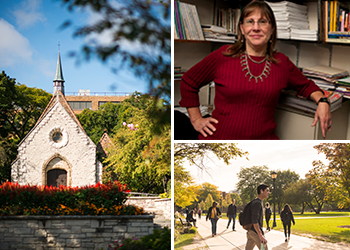MAKING A DIFFERENCE: THE SOCS BLOG
Fieldwork in the courts: What we learn from observing sexual assault adjudication
By: Heather Hlavka and Sameena Mulla

Photo Credit: Heather Hlavka 2013, field site
The Milwaukee County Courthouse stands only blocks away from Marquette University. For over ten years, we have walked with our students over the I-43 freeway toward the main entrance on the south side. Passing through MacArthur Square commons – a small green space surrounding a water fountain – the Neo-Classical limestone high-rise stands out against an otherwise empty sky. The hustle of bus passengers and visitors to the Milwaukee Public Museum and Central Library often mixes with the lunchtime clamor surrounding the Food Trucks lined up outside the Courthouse Annex. Close to the shores of Lake Michigan, the seagulls linger, waiting for food scraps.
Our ethnographic study on sexual assault adjudication begins here, in Milwaukee - Wisconsin’s largest city and second-most densely populated metropolitan area in the Midwest, second only to Chicago. The courthouse is many things for many people. For some of our students in Social and Cultural Sciences, it is a place to take part in experiential learning; to apply social theories, practice research methods, and reflect on criminal justice ethics and practices. For others, it is a place of business – where marriage licenses are signed, fines are paid, or passports are renewed. For many still, it is a place where life and death decisions are made, traumas are laid bare, and pain and power are visceral. For us, as interdisciplinary collaborators trained as a sociologist and an anthropologist, it was our research site. But it was also much more. Through nearly 700 court hearings, years of observation, archival analysis, and interviews with judges, attorneys, advocates, officers, forensic scientists, and nurse examiners, the process was also transformative. The courthouse became a site of friendships, mentorship, learning, unlearning, and understanding. Our team-based approach invited undergraduates to draw from their coursework as well as their lived experiences while exploring the sensitive nature of sexual violence and racial inequities in the criminal courts. It was this journey that revealed how deeply criminal prosecution of sexual violence is invested in racial hierarchies, class identity, and cultural narratives of gender and sexuality. Ethnographic methods allowed us to generate deep insight into the processes of adjudication and local knowledges about race, place, and the forensic science that affects it.
In our forthcoming book published by New York University Press, Bodies in Evidence: Race, Gender, and Science in Sexual Assault Adjudication, we center the process of courtroom testimonial violence and inequalities through an intersectional analysis. Our book is about sexual adjudication in the age of forensic intervention, and how expertise is imagined and practiced in the day-to-day operations of a court of law. We show that despite expectations, forensic science repeatedly fails to resolve questions of guilt and innocence. Rather, the courts curate narratives of sexual assault that rely heavily on medico-legal knowledge, forensic science, and police expertise to frame sexual violence often only because attorneys believe that jurors expect it. These courtroom narratives were sometimes bald in their brutality and sometimes subtle, casting sexual violence through racially degrading narratives that intertwined tropes of victimhood and criminality with geography, poverty, gender, and sexuality. The courts were replete with the spectacle of women’s suffering, particularly that of Black and brown women and children. We have written on how young people were often discredited in child sexual assault cases based on age, race, class, and sexuality. We have also analyzed how various forms of evidence, such as text messages, were transformed in front of juries in ways that reinforced cultural narratives. Rather than resolving the proverbial “he said, she said” in sexual assault, forensic evidence retells familiar rape myths, but through narratives that include scientific authority. While many who participate do not think of the law as producing justice, the court of law does function to subjugate and dominate all its participants, and our research shows that rape myths become cemented into law itself.
Heather Hlavka is Associate Professor of Criminology and Law Studies at Marquette University.





